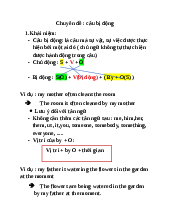


Preview text:
Giải bài tập SGK Tiếng Anh lớp 12 Test Yourself F (Trang 185-186-187)
I. Listening (2.5 points)
Listen and fill in the blanks with the information as you hear. (Nghe và điền vào chỗ trống thông tin bạn nghe được.) Gợi ý: 1. November 16th, 1945 2. 193 3. 60 4. teacher-training 5. heritage
II. Reading (2.5 points)
Read the text then answer the questions that follow. (Đọc đoạn văn sau đó trả lời các câu hỏi theo sau.) Hướng dẫn dịch:
Ngày nay, ngày càng có nhiều phụ nữ tham gia vào lực lượng lao động trên toàn thế giới.
Ở nhiều khu vực, họ chiếm đa số lực lượng lao động. Ngay ở những quốc gia có tỉ lệ lao
động nữ thấp, chẳng hạn như các quốc gia Ả rập, số phụ nữ có việc làm cũng tăng lên. Ở
Đông Nam Á, lao động nữ chiếm 80% lực lượng lao động trong các ngành cần nhiều nhân
công như dệt, đồ chơi, giày và điện tử. Ở châu Mĩ Latinh và vùng Ca-ri-bê, phụ nữ chiếm
70% lực lượng lao động trong các ngành công nghiệp dịch vụ.
Công ăn việc làm rõ ràng đã mang lại cho phụ nữ nhiều lợi ích kinh tế và xã hội. Trong
quá khứ, họ thường bị loại trừ khỏi việc làm trả lương và vì thế lệ thuộc về kinh tế vào
chồng hoặc cha của họ. Ngày nay phụ nữ có một tri thức tốt hơn và có thể tự thăng tiến dễ
dàng hơn xưa nhiều. Quyền được học hành và sự thay đổi địa vị kinh tế đã cho phụ nữ
nhiều tự do hơn. Nhiều phụ nữ nổi tiếng trong lĩnh vực mà trước đây chỉ dành cho nam
giới và một vài phụ nữ thậm chí đã trở thành thủ tướng.
Gợi ý trả lời câu hỏi:
1. Which countries, according to the passage, have low levels of female paid workers? () => In Arab countries.
2. In which sectors do you find the majority of working women in Southeast Asia? ()
=> In textile, toy, shoe and electronic sectors.
3. What is the percentage of women who work in the service sector in Latin America and the Caribbean? () => It's 70%.
4. On whom did women depend economically in the past? ()
=> They depended on their husbands or fathers.
5. According to the passage, what are the two factors that give women more freedom nowadays? ()
=> They are the access to education and the change in economic status.
III. Grammar (2.5 points)
Use the following phrasal verbs lo complete the sentences below. (Sử dụng các cụm động từ sau để hoàn
thành những câu bên dưới.) Gợi ý: 1. grow up 2. slay on 3. wait up 4. give in 5. catch up 6. speak up 7. watch out 8. cool off 9. keep up 10. fall behind
IV. Writing (2.5 points)
In about 120 words, write about the changes in women's role in the family in comparison with 50 years
ago. (Trong khoảng 120 từ, viết về những sự thay đổi của vai trò phụ nữ trong gia đình so với cách đây 50 năm.) Gợi ý: Bài viết 1
Women's role in the family has changed dramatically compared with that 50 years ago.
First, women are now better educated and can promote themselves much more easily than
in the past. Second, more and more women are now joining the paid labour force
worldwide. The number of women who have jobs is rising. Paid employment has
undoubtedly brought economic and social gains to many women. In the past, they were
often excluded from many paid jobs and thus economically dependent on their husband or
fathers. Third, they have less children. Today, women often have one, two or even no
children instead of a bunch of children in the past. Last but not least, they do less domestic
chores thanks to domestic appliances. Bài viết 2
In recent years women's role has changed dramatically in comparison with that 50 years
ago. The changes are explicitly seen in many sectors.
Firstly, in education, women nowadays are well educated, that is they can enjoy the
benefits of education in every level. Women are not confined in the walls of the family
with childbearing or childrearing. They participate in almost every area of public life.
Many women have gained the high ranks in social or governmental sector. As a result of
this women no longer depend economically on their husbands or families.
In addition, they do not worry about the number of children thanks to new thoughts on
lifestyle. At present people no more see a family of very many children, six or more. And
domestic chores are not a burden for women because they are done by machine.
Consequently women at present can promote themselves in social life much more easily.




